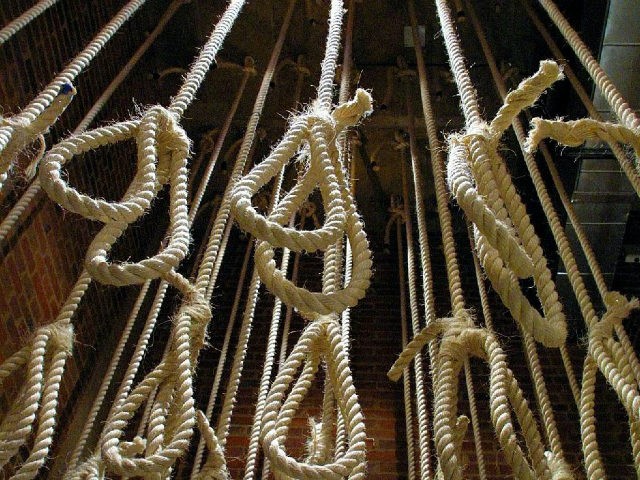A new report from Amnesty International charges the Syrian government with systematically executing political dissidents at the Saydnaya military prison.
According to the report, officers hanged up to 13,000 people at the prison between 2011 and 2015, most of them civilians opposed to the government of dictator Bashar Assad. Amnesty based the report on interviews with 84 former detainees, guards, officials, judges, lawyers, doctors, and the family members of detainees.
The report states officers hanged people in groups of up to fifty at a time, weekly and sometimes twice a week, after sham “trials” where the accused had no legal representation. Prosecutors often introduced forced “confessions” as evidence at these trials, which ran for as little as one minute apiece.
Upon receiving a death sentence, officers reportedly told prisoners they had been selected for transfer from the hideous Seydnaya facility to civilian prisons, only to be led into basement cells where they were beaten for hours until they screamed “like they had lost their minds,” as one detainee put it. The blindfolded prisoners were told they had been sentenced to death only minutes before the nooses went around their necks.
One former inmate of the prison spoke of dying men gurgling helplessly as they dangled in the kill room for ten minutes and more. A judge who witnessed one of the mass hangings reported prison guards walking through the rows of hanging captives and pulling on the legs of those who lacked the body weight necessary to die after an acceptable interval.
“Survivors of Saydnaya have also provided spine-chilling and shocking testimonies about life inside the prison. They evoke a world carefully designed to humiliate, degrade, sicken, starve and ultimately kill those trapped inside,” Amnesty adds, dubbing Saydnaya a “human slaughterhouse.”
Those who survived the prison often emerged with less than half their original body weight. Inmates spoke of torture, rape (including the forced rape of others, for the amusement of the guards), and horrifying sanitary conditions. The guards spent part of each morning pulling dead prisoners from their cells.
A former prisoner compared Saydnaya to Dante’s Inferno in an interview with the UK Guardian: “At each state you reach, you discover that the previous stage was actually better, and you start worrying about the next stage.”
Another chilling observation from the Amnesty International report is that the 13,000 killed at Sadnaya are in addition to the estimated 17,000 killed in Syrian prisons through deprivation and torture since 2011.
“The horrors depicted in this report reveal a hidden, monstrous campaign, authorised at the highest levels of the Syrian government, aimed at crushing any form of dissent within the Syrian population,” declared Amnesty International research director Lynn Maalouf.
Maalouf called for an end to “the cold-blooded killing of thousands of defenseless prisoners,” an end to physical and psychological torture by the regime, and trials for the Syrian officials responsible. Amnesty International wants the results of its report discussed at the upcoming Syria peace talks in Geneva, ideally in concert with an independent United Nations investigation.
Those demands will not be easily fulfilled. CNN notes that the Assad regime has been credibly accused of “systematic torture and killing” for years, without much in the way of accountability. Assad himself is more secure than ever in power, thanks to assistance from Russia and Iran. He routinely dismisses war-crimes accusations as politically motivated slander intended to undermine his regime.
NPR quotes report author Nicolette Waldman calling upon Russia to take action against Syria’s “war crimes.”
“It’s very difficult to believe that they could be supporting this type of massive crimes against humanity and war crimes,” she said. Regrettably, she may need to work on increasing her ability to suspend disbelief. Russia has not been eager to support U.N. investigations into crimes against humanity in Syria, and the International Criminal Court has little sway over either Russia or Syria.
Reuters noted responses on Twitter from British Foreign Minister Boris Johnson, who was “Sickened by reports from Amnesty International on executions in Syria. Assad responsible for so many deaths and has no future as leader,” and his opposite in France, Jean-Marc Ayrault who said, “This barbarity cannot be the future of Syria.”
Canada’s Globe and Mail ran an op-ed on Tuesday calling for Canada to invoke the U.N. Convention Against Torture over the Saydnaya report, but this call to action fizzles when the authors concede the ICC has no real power to do anything except vaguely compromise the “political legitimacy and fortunes” of Syrian leaders who ordered or tolerated the slaughterhouse.
The Assad regime and its high officials do not need all that much “political legitimacy” when their opponents have been killed, subjugated by military force, or terrorized into silence. Six years into the Syrian civil war, the international community finds itself right where it started: unable to do much beyond issuing strongly-worded statements of outrage and maybe derail the careers of a few Assad flunkies during the post-war “political transition.” These days, as seen above, the strongly-worded statements of outrage are likely to be delivered as tweets.
As Amnesty International points out in their report, it’s not even clear if the mass killings and other crimes against humanity at Saydnaya have stopped yet. The account delivered by Amnesty stops in 2015, but no one seems to know what’s going on in Syrian prisons today. CNN tried contacting the Syrian government for a comment on Amnesty’s report but received no response.

COMMENTS
Please let us know if you're having issues with commenting.